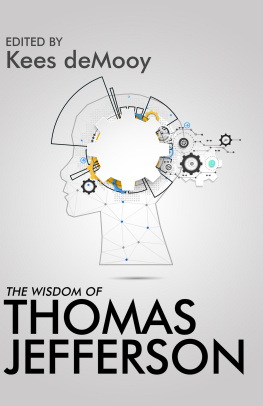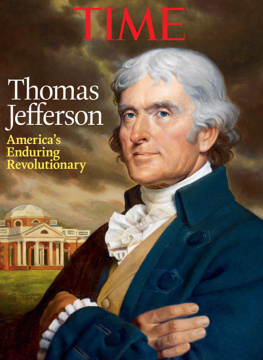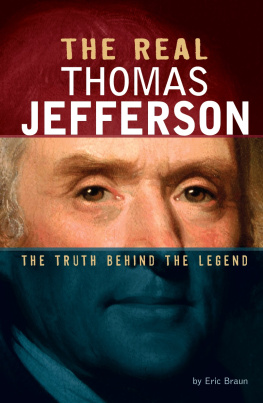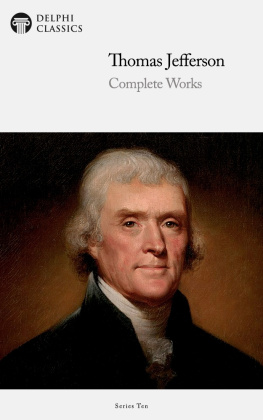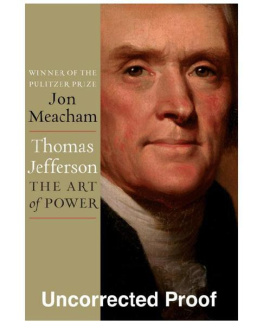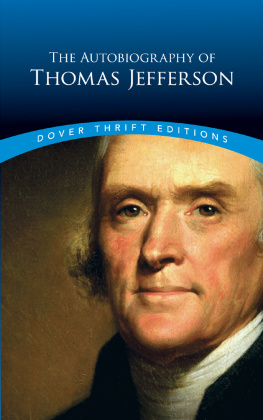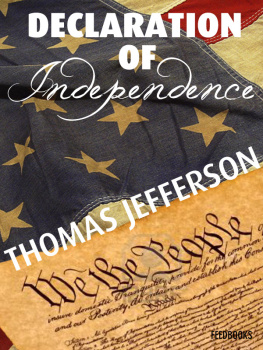THE WISDOM
OF
Thomas Jefferson
Edited by
Kess de Mooy
Philosophical Library

CITADEL PRESS
Kensington Publishing Corp.
www.kensingtonbooks
Contents
About to enter, fellow-citizens, on the exercise of duties which comprehend everything dear and valuable to you, it is proper you should understand what I deem the essential principles of our Government, and consequently those which ought to shape its Administration. I will compress them within the narrowest compass they will bear, stating the general principle, but not all its limitations. Equal and exact justice to all men, of whatever state or persuasion, religious or political; peace, commerce, and honest friendship with all nations, entangling alliances with none; the support of the State governments in all their rights, as the most competent administrations for our domestic concerns and the surest bulwarks against antirepublican tendencies; the preservation of the General Government in its whole constitutional vigor, as the sheet anchor of our peace at home and safety abroad; a jealous care of the right of election by the peoplea mild and safe corrective of abuses which are lopped by the sword of revolution where peaceable remedies are unprovided; absolute acquiescence in the decisions of the majority, the vital principle of republics, from which is no appeal but to force, the vital principle and immediate parent of despotism; a well-disciplined militia, our best reliance in peace and for the first moments of war till regulars may relieve them; the supremacy of the civil over the military authority; economy in the public expense, that labor may be lightly burthened; the honest payment of our debts and sacred preservation of the public faith; encouragement of agriculture, and of commerce as its handmaid; the diffusion of information and arraignment of all abuses at the bar of the public reason; freedom of religion, freedom of the press, and freedom of person under the protection of the habeas corpus, and trial by juries impartially selected. These principles form the bright constellation which has gone before us and guided our steps through an age of revolution and reformation. The wisdom of our sages and blood of our heroes have been devoted to their attainment. They should be the creed of our political faith, the text of civic instruction, the touchstone by which to try the services of those we trust; and should we wander from them in moments of error or of alarm, let us hasten to retrace our steps and to regain the road which alone leads to peace, liberty, and safety.
Thomas Jefferson's First Inaugural Address (March 4, 1801)
The Wisdom of Thomas Jefferson consists of seventeen chapters, each containing chronologically arranged quotations from Jefferson's correspondence, speeches, and published works. By placing the material in the order that it was written, readers can follow the progress of historical events and witness the evolution of Jefferson's thinking over time. The selections are made more readable by selective modernization of eighteenth-century spelling, punctuation, and grammar conventions where the meaning of the passage might be difficult to understand. Editorial insertions are separated from the text with square brackets. Brief introductions to selected passages have been provided where necessary, in order to place quotes in proper historical context. As a further aid to the reader, a timeline with relevant biographical and historical events has been inserted after the introduction, and a representative cross section of some of Jefferson's finest works are included in the appendixes.
In the last decade of his life, Thomas Jefferson lived sequestered at his beloved Monticello, surrounded by his grandchildren. He remained relatively healthy for a man in his seventies, riding miles on horseback, working in his gardens, and reading. His fingers crippled with age, the aged statesman nevertheless answered over a thousand letters per year from friends and well-wishers, a self-imposed commitment that made him complain that his was the life of a mill-horse, who sees no end to his circle but in death. Thoughts of his own demise were often on his mind, and he frequently ruminated on the legacy that he would leave his family and the American public. What he foresaw saddened him greatly. After decades of dedication to his country, his wish for tranquility and dying in the good will of all mankind was slipping through his fingers. A relentless combination of personal and public problems conspired to prevent his longed-for happiness. His family and closest friends were dying around him, and he suffered from crippling debts. His optimism for the United States was seriously challenged by the Missouri Compromise and what this decision meant for black and white Americans, and related to this, he was mortified by assertions in the press that he fathered children by one of his slaves, Sally Hemings. However, despite all of these personal and public trials and tribulations, Jefferson's reputation would remain intact, and he continues to be remembered as one of America's greatest presidents.
Throughout his long and illustrious political career, Jefferson looked forward to a comfortable retirement at Monticello, his family and closest friends within easy reach. A series of premature deaths, however, nearly robbed him of this dream. While still in his forties, he wrote to his daughter Martha (Patsy) to say that to your sister and yourself I look to render the evening of my life serene and contented, but with a pang of sadness, added that its morning has been clouded by loss after loss till I have nothing left but you. Martha Wayles Skelton, who Jefferson married in 1772, bore him six children but only two survived into adulthood. Ten years into their blissful marriage, Martha died from complications of child-birth, sending Jefferson into utter despondency. He faithfully upheld his deathbed promise to her never to remarry. Three decades after the death of his wife, Jefferson lost one of his two remaining daughters, Mary, to the same tragic circumstance that had taken his wife to an early grave. Death and disease also carried away many of his dearest friends. His closest childhood companion, Dabney Carr, who had married Jefferson's sister, Martha, did not live to see the Revolution. As Jefferson stood on the threshold of his eightieth year, he observed that, of those who signed the Declaration of Independence, I am the only one south of the Potomac.
In addition to the loss of his family and friends, Jefferson was weighed down by tremendous debts that he had accrued. After decades of devotion to the welfare of the fledgling United States and its financial stability, his personal fortunes steadily suffered and he lived out his days at the mercy of creditors. Despite meticulous record keeping, he never balanced his ledgers in order to get a complete picture of his financial state. Had he done so, it would have shown that his Virginian planter lifestyle, based on large land holdings worked by hundreds of slaves, was worsening matters and driving him ever closer to bankruptcy. Instead, he continued on the path familiar to him, indulging his expensive tastes for scientific apparatuses and curiosities, food, wine, and his life-long passion, books. In 1814, he was forced to sell his entire collection of nearly 6,700 volumes to Congress, ostensibly to replace the library lost when British forces burned the Capitol, but mainly to raise cash. Faced with the depressing sight of empty shelving, he began purchasing more books immediately. I cannot live without books, he admitted to John Adams. Faced with the shameful knowledge that he would pass over $100,000 in debts on to his heirs, he was forced in the last year of his life to petition the Virginia legislature for a special lottery on his behalf. He was refused. Death spared him the mortification of witnessing his family forced to auction off Monticello, his slaves, and the majority of his estate.
Next page
